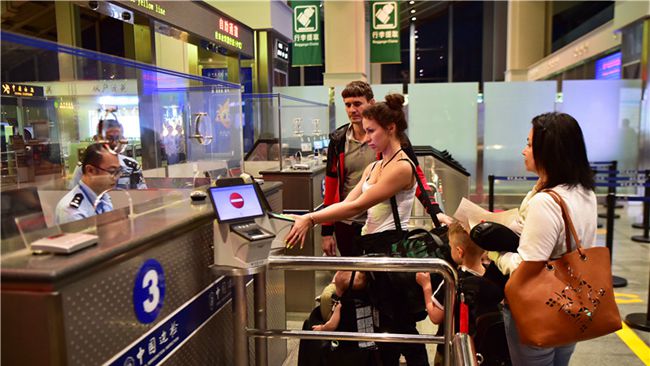On 26 December, the National Health Commission issued a notice on the general plan to implement the "Category B B Control" for novel coronavirus infections. The circular mentions that the management of the movement of Chinese and foreigners will be optimised and the policy of post-entry nucleic acid testing and isolation will be abolished. The Chinese people who have undergone the nucleic acid test 48 hours prior to their arrival, and whose health declaration is normal and there is no abnormality in the routine quarantine at the customs port, will be allowed to enter the social side. Removal of the "Five Ones" and seat limits on the number of international passenger flights.
Once the new policy was released, the impact on travel spending quickly became apparent. Statistics from Ctrip.com show that within half an hour of the new policy's release, searches for popular overseas destinations on the platform jumped 10 times year-on-year, with outbound (including China, Hong Kong, Macau and Taiwan) airfare and overseas hotel searches reaching a three-year peak.
At the same time, several outbound destinations that were big hits before the epidemic began to see significant growth in search popularity during the 2023 Chinese New Year period. Ctrip.com data shows that Macau, China, Hong Kong, China, Japan, Thailand, South Korea, the United States, Singapore, Malaysia, Australia and the United Kingdom are the top 10 destinations with the fastest growth in search volume. Searches for Spring Festival outbound group tours jumped sixfold.

It is worth noting that despite the fact that the total amount of outbound travel in China has remained low since the epidemic, the per capita spending on outbound travel has increased rather than decreased. According to Ctrip, the per capita spending on air tickets and high-star hotels out of the mainland has increased by 64% and 40% respectively in the past six months compared to the pre-epidemic period.
The import and export of travel services in China has continued to recover since this year. Statistics released by the Ministry of Commerce show that from January to October, the import and export of travel services in China was RMB 689.06 billion, up 9.1% year-on-year.
According to Fang Zexie, industry analyst at Ctrip Research Institute, with the recovery of the supply side of tourism and the control of inflation levels in major economies around the world, the overall price of outbound travel for air and alcohol is expected to fall back to the pre-epidemic level; however, there are still short-term constraints due to the recovery of supply-side facilities and manpower, so the fall in prices will still take some time.
However, from a local perspective, the per capita spending on high star hotels in Asian countries has declined. Ctrip.com data shows that the prices of five-star hotels in Thailand, Japan, South Korea and Malaysia in the last six months have dropped by 20% to 30% compared to the prices before the epidemic. For example, the per capita spending on five-star hotels in Thailand and Vietnam both dropped by about 20 per cent compared to the same period in 2019; five-star hotel prices in Malaysia dropped by 30 per cent; and Japan and South Korea dropped by about 20 per cent.
"Mainland Chinese tourists contribute a lot to international travel in Asia, and with the current recovery of less than 5% of international arrivals from Mainland China, the absence of Chinese tourists has somehow caused difficulties in rising tourism prices in Asia. However, with the gradual liberalisation of outbound travel and favourable policies overlaid with price concessions, it is believed that these regions will be the first to receive the attention of Chinese tourists, and Ctrip's outbound travel recovery layout will be opened from these countries one after another." Fang Zexi said.
It is worth noting that there are still certain restrictions on the "supply side" of the visa market in the short term. Ctrip visa-related sources said that at present, new or expired passports are still the first to be processed for business, study, family visits and other needs; most overseas countries have opened their visas for processing, but due to the domestic epidemic many consulates are understaffed resulting in delays in visa processing.

Even so, the enthusiasm of Chinese users for outbound travel is still difficult to hold down. Ctrip visa data shows that since December 7, the number of overseas visa applicants has increased by more than 12 times compared to last year, with Singapore, Japan, South Korea, the United States, the United Kingdom, Australia and other countries having a higher visa processing fever.
In order to meet the relaunch of outbound travel, online travel platforms have made early preparations. On Ctrip.com, during the promotion of the "Global Fly" super product day, the products that were regularly on sale were snapped up within 10 seconds, and the number of international airline reservations was 33.2% higher than in November; in addition, Ctrip.com is also working intensively on the layout of the "Super Global Tour In addition, Ctrip is also working hard on the "Super Global Tour" campaign, including developing and sourcing related products, setting up an overseas epidemic policy enquiry portal, selecting and developing a reputation list of overseas destinations, and planning for overseas guides.
According to Fang Zexie, "The release of the new regulations ensures a smoother environment for cross-border travel from a policy level, which will effectively mobilise tourists' willingness to travel. We are also very much looking forward to the further implementation of the outbound travel policy next, as the ice and snow will eventually melt and the spring of outbound travel has arrived."

